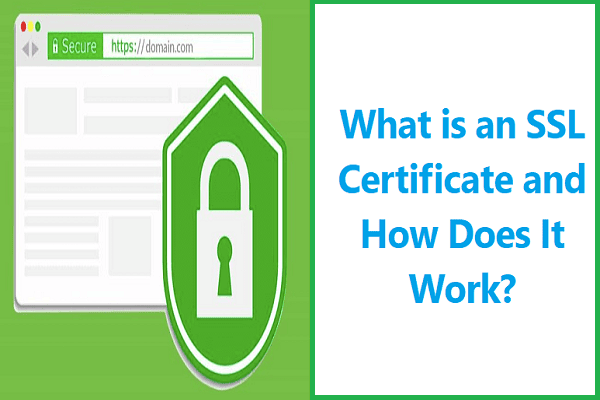What is an SSL Certificate and How Does It Work?
4 min read
An SSL Certificate is a digital certificate that authenticates the identity of a website and encrypts information sent to the site. This is an important security feature for online businesses, as it helps protect customers’ personal information. In this blog post, we will discuss what an SSL Certificate is and how it works!
What is an SSL Certificate?
An SSL Certificate is issued by a Certificate Authority (CA), which is a trusted third-party organization that verifies the identity of the website. The CA then issues a digital certificate that contains the web site’s public key and information about the site’s identity. When a customer visits the website, their browser will use the public key to encrypt any information that is sent to the site. This ensures that only the intended recipient can decrypt and read the data.
Importance of SSL Certificate
The SSL Certificate also contains information about what domain name(s) it secures, as well as its expiration date and who issued it. When a browser connects to a website secured with SSL, it checks all of this information to verify that the connection is secure. If everything checks out, the browser will display a green padlock and the word “Secure” in the address bar.
An SSL Certificate is an important security feature for online businesses, as it helps protect customers’ personal information. By encrypting information sent to the site, an SSL Certificate ensures that only the intended recipient can decrypt and read the data. This provides peace of mind for customers and helps build trust between them and your business.
It’s important to have a DigiCert SSL Certificate for your website because it protects customers’ personal information by encrypting any information sent to the site. This is an important security feature for online businesses!
An SSL Certificate also contains information about what domain name(s) it secures, as well as its expiration date and who issued it.
Features Of SSL Certificate
An SSL certificate is a digital certificate that authenticates the identity of a website and encrypts information exchanged between the user and the website. When an SSL certificate is installed on a website, it activates the padlock and the HTTPS protocol and allows secure connections from a web browser to the website.
Also read: 6 Ways to Develop SEO Ranking
Some key features of SSL certificates include:
-Authentication: The SSL certificate verifies the identity of the website owner and ensures that communication between the user and the website is private.
-Encryption: The SSL certificate encrypts information exchanged between the user and the website, protecting it from eavesdropping or interception.
-Trust: When an SSL certificate is installed on a website, it creates a trust relationship between the user and the website. This trust is indicated by the presence of a padlock and HTTPS protocol in the web browser.
-Browser Compatibility: SSL certificates are compatible with all major browsers.
Pros and Cons Of SSL Certificate
When it comes to SSL certificates, there are pros and cons to consider. Here are some of the key benefits of using an SSL certificate:
- Increased trust and credibility with customers – When you have an SSL certificate installed on your website, it shows your customers that you’re taking security seriously. This can help to build trust and increase conversions.
- Protection from hackers – An SSL certificate helps to protect your website from hackers who may try to steal sensitive information like credit card numbers or passwords.
- Increased SEO ranking – Google gives a slight ranking boost to websites that have SSL certificates installed, so this can help improve your SEO results.
And now for the cons:
- Increased cost – An SSL certificate can be a bit pricey, but the benefits are well worth it.
- Increased complexity – Installing an SSL certificate can be a bit more complicated than installing a standard website certificate. If you’re not comfortable doing this yourself, you may need to hire a web developer.
- Potential for website slowdown – When an SSL certificate is activated, it adds extra processing time to each page load. This can cause a slight slowdown in your website’s performance. However, the benefits of using an SSL certificate usually outweigh this minor downside.
As you can see, there are both pros and cons to using SSL certificates on your website. Overall, they provide a number of important benefits that can help to improve your website’s security and SEO. If you’re considering installing an SSL certificate, be sure to weigh the pros and cons carefully to see if it’s the right decision for your business.



